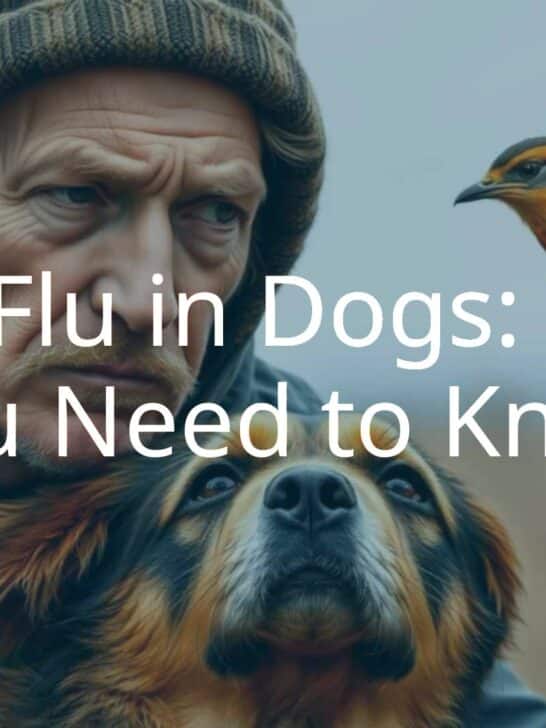How To Handle Worms & Parasites in German Shepherd Dogs
German Shepherds are usually considered a healthy breed of dog. They are strong, lovely, affectionate, and overall a fantastic dog for any dog owner.
Despite their popularity all over the world, they are prone to some health issues.
Similar to humans, worms are the most notorious internal parasites which cause unwanted health problems in German Shepherds.
Worms can create a variety of issues, and in the most severe situations it can result in serious consequences.
Following the proper steps to reduce the chances of your German Shepherd getting parasites is very important.
In this article, we will answer some common questions dog owners have regarding worms, and how you can get rid of them.
We will also outline the most common types of worms, with their symptoms and common preventive measures.

How Your German Shepherd Dog Can Get Worms
Having worms inside of your dog’s body greatly affects the overall health status of your adorable companion.
Despite your day-long care, as a responsible dog owner, you may wonder about how your dog can get these notorious worms.
Knowing the answer to this question will help you to treat your dog (if your dog already has worms) and prevent further worm infection (if your dog doesn’t have worms).
There are a lot of ways by which your lovely dog can get worms. Among them, some of the most probable reasons are:
From the mother
Your dog can easily get worms like roundworms from their affected mum. In this case, your pup will be born with worms.
These worms can produce serious infections in young puppies.
Also, dogs can be infected with worms while drinking milk from infected mothers.
Eating contaminated meat
German Shepherds are hunting dogs and they like to scavenge occasionally.
Due to their natural hunting behavior, your dog could chase and eat other infected animals like birds, rodents, or other small animals.
Eating worm eggs
Roundworm eggs are frequently found in the outside soils and these eggs can remain active for several months after laying.
An adult roundworm female can lay near about 85000 eggs per day.
While roaming outside, your dog can easily ingest those eggs or bring those eggs into your home and contaminate others.
Mosquito bite
Heartworm eggs of dogs can easily pass from one infected dog to another healthy dog through blood-sucking vectors like mosquitoes.
From fleas
Fleas help carry the larvae of tapeworms during grooming, and can infect other healthy dogs.
During grooming
Usually roundworm eggs get attached to the coat of your dog.
While grooming, your dog may swallow the eggs or larvae of worms and become infected with roundworm infection.
Also, there’s a chance of penetrating skin of your dog by hookworm or other flukes which might lead to a worm infestation.
Eating raw or contaminated food also puts your dog at a great risk of having worm infestation.
That’s why, while giving raw food, you need to be more cautious and you should take necessary preventive measures to avoid the contamination.
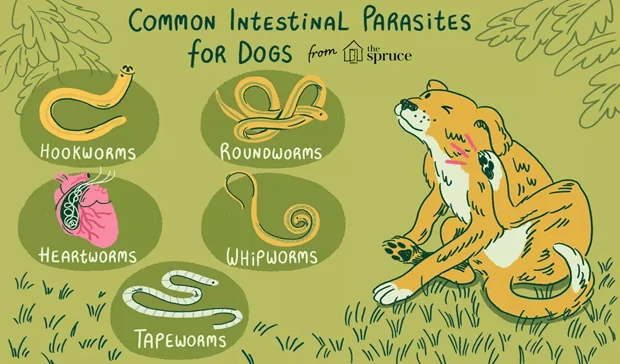
Types of Parasites in Dogs
Your German Shepherd can get a variety of worms, such as roundworm, heartworm, hookworm, flatworms, flukes, pinworms, etc.:
Roundworms
This is the most common types of worms in dogs, and can act as both external and internal parasites.
They are usually considered external parasites when in the soil or water.
After ingestion, they act as an internal parasite and produce significant symptoms.
Toxocara canis and Toxascaris leinina are the two most common roundworms in dogs.
Hookworms
These are smaller than the roundworm and look like a thread.
They actually live in the intestine of your dog and attach to the wall of the intestine and suck blood.
That’s why they are known as hookworm. Ancylostoma caninum or Ancylostoma brazilienseis are the most common hookworm of dog.
Heartworm
Dirofilaria immitis, a small threadlike worm can block the major artery in the heart which leads to various organ failures, and ultimately death if your dog is left untreated.
Ringworm
This refers to a fungal infection that produces significant lesions such as inflamed, red, swollen patches over the skin. This is mostly caused by fungus Microsporum canis.
Whipworm
This includes Trichuris vulpis, a long-necked worm that attaches to the intestinal wall and feeds on nutrients from the blood.
Tapeworm
Dipylidium caninum, a major tapeworm, can be found in your dog’s stomach.
These long, segmented, interconnected rice-grain-like worms can deplete your dog’s energy and comfort by consuming its nutrients.
No matter what type of worm is infecting your dog, you always need to see a veterinarian right away.
When in doubt, go see your vet ASAP as time is crucial when this happens.

Symptoms of Worms in Dogs
After having worm infestation, your German Shepherd can display a number of symptoms depending upon the load and severity of the infection.
The most common symptoms of worm infestation may include the following:
- Diarrhea
- Coughing
- Abdominal pain
- Vomiting
- Gas and bloating
- Weight loss
- Lack of appetite
- Weakness
- Fatigue
- Big belly syndrome or abdominal swelling, etc.
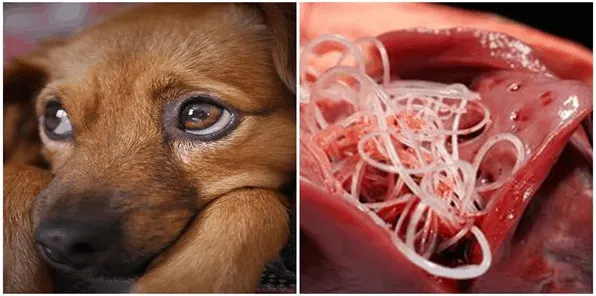
How to Diagnose Worms
As soon as you notice these above-mentioned symptoms, you should collect the stool of your dog and send these to your nearest vet hospital for examination.
Your vet will be able diagnose any issues, and discuss the best treatment options for your dog.
By this microscopic examination of stool sample, your veterinarian can easily confirm the presence of tapeworm, roundworm, or other intestinal worms.
For accuracy, your vet will ask some questions regarding the history of your dog, their food habits, previous deworming history, etc.
To diagnose heartworm, veterinarians usually do a blood test.
According to the American Heartworm Society (AHS), heartworms can affect dogs of all ages, and will produce mild to no symptoms at first.
It actually is recommended by veterinarians to check your dog for heartworms every year.
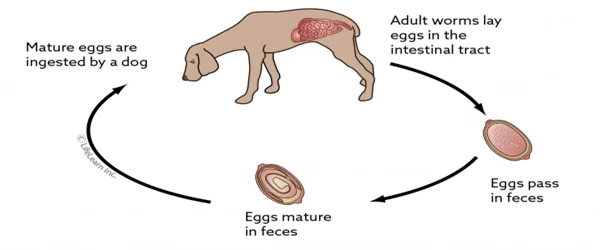
Prevention and Treatment of Worms In German Shepherds
The first thing you need to understand is that there is no way to completely prevent your German Shepherd dog from getting worms.
Although, by taking necessary steps, you can reduce the risk of worms in your dog.
As soon as you’re adopting of buying a dog, you need to consult with your veterinarian and know the best effective way to get rid of the worm.
Your vet will prescribe deworming medications to treat different types of dog worms.
Also, veterinarians suggest every pet owner should perform regular deworming schedules to avoid worm problems.
For optimal results, your Shepherd puppy should get dewormed every 2 weeks until 12 weeks of age.
It can then reduce to once per month up until six months of age.
After six months, you can deworm your dog once every 3 months by taking it to the vet hospital.
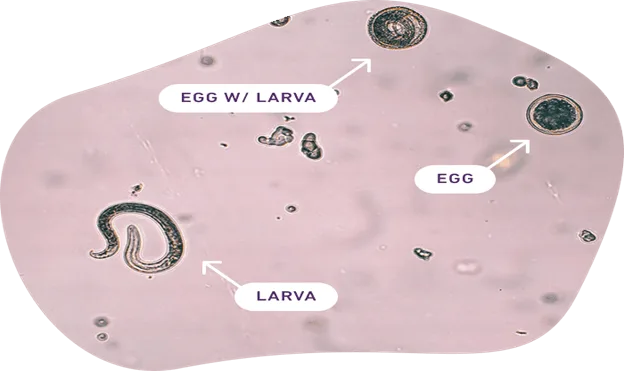
Concerned dog owners can follow these steps to reduce your dog’s risk of having internal parasites. These includes:
- Avoid raw and contaminated meat if you’re unsure about the feed.
- Using flea collar and mosquito repellent
- Regular deworming
- Regular testing of your dog
- Maintain best hygiene both inside and outside of your home
Some pet owners even use ground pumpkin seed and dried coconut with probiotics to get rid of parasites.
If your German Shepherd shows symptoms of having worms, make an appointment with your veterinarian immediately to ensure that they receive the best medicinal treatment.


















